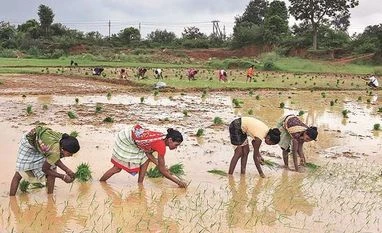Last month, Prime Minister Narendra Modi launched an ambitious scheme to promote 10,000 Farmer-Producer Organisations (FPOs) in the next five years, starting 2019-20.
If implemented well, the scheme could mobilise almost three million farmers (assuming that each FPO has a minimum membership of 300 farmers) into economically sustainable collectives. Two thousand of these FPOs are to be formed in 2020-21 itself, according to a recent reply in Parliament.
A farmer-producer organisation or company is a quasi-producer collective registered as a private limited company under the Part IXA of the Companies Act (which means it enjoys tax benefits). It is a means to help small farmers maximise their income by offering distribution and marketing support for their produce. FPOs are viewed as a critical institutional solution to the chronic problem of falling farm incomes.
Ahead of final guidelines for the scheme, four broad points have emerged from the press note and a strategy paper.
First, the minimum members required to start an FPO will be 300 instead of 1,000 under the current FPO guidelines.
Second, instead of resource institutes (RIs), the new FPOs will be formed and promoted by cluster-based business organisations (CBBOs), which will be selected through an open bidding process. The CBBOs, according to senior officials, will be RIs of a “higher order”, comprising sector professionals, and acting as a platform for end-to-end knowledge for all issues related to the promotion of FPOs. They could comprise business support organisations, trusts, societies, corporations, foundations, corporate social responsibility cells, reputed non-government organisations, individuals or even federated successful FPOs and agri-research institutions such as the Krishi Vigyan Kendras.
Third, apart from Small Farmers Agri-Business Consortium (SFAC) and NABARD, the National Cooperative Development Corporation (NCDC) has also been roped in to act a nodal agency for promoting the FPOs.
Fourth, there will be a mother National Project Management Agency (NPMA) housed in SFAC to monitor and guide the scheme.
A fresh approach is welcome given that the growth and development of FPOs over the past 10 years or more have been uneven. India has managed to create just 5,000 FPOs so far. Only about a third are viable and another fifth are struggling to survive and the rest are in the process of mobilising equity, drawing up business plans and so on.
Thus, if the scheme is not to end up as little more than a number-chasing exercise, some of the new proposals need to be revised urgently, not least because the chief beneficiaries are beleaguered small farmers.
One proposal that demands reconsideration is the decision to lower minimum threshold for FPO formation. When basic economics dictates economies of scale, this provision could lead to the proliferation of small, unviable FPO. “Lowering the minimum member required to form an FPO to 300 from the existing 1,000 is not a sensible idea. Our experience shows that any FPO with less than 700 members is not viable in the long-run,” Pravesh Sharma, former managing director of Small Farmers’Agri-business Consortium, told Business Standard.
As for replacing RIs with CBBOs, it is hard to see the utility. RIs are typically ground-level NGOs that work to promote and nurture FPOs whereas the format of CBBOs is still hazy. “Unless we have well defined guidelines in place on the form and structure of a CBBO, they could be used as a tool by global consultancies to gain a foothold in the FPO space,” said Ashis Mondal, founder-director of Action for Social Advancement (ASA), a Bhopal-based Resource Institute for FPOs said.
ASA has promoted more than 54 FPOs and Mondal is considered one of the pioneers of the FPO concept in India, having drawn up the first guidelines for the sector.
He added that involving NCDC among the nodal agencies for promoting FPOs goes against the grain of the entire concept of these institutions and unless checked they could become marketing arms of Primary Agriculture Cooperative Societies or PACS. Sharma thinks the involvement of NCDC is welcome because the FPO model was designed to be complementary to cooperatives and not in competition.
Amid all the diverging views, one thing is clear: India needs fresh ideas on farmer collectives to boost the income of small and marginal farmers. FPOs do offer a useful way of achieving this, but the new guidelines could do with some fresh scrutiny too.
Unlock 30+ premium stories daily hand-picked by our editors, across devices on browser and app.
Pick your 5 favourite companies, get a daily email with all news updates on them.
Full access to our intuitive epaper - clip, save, share articles from any device; newspaper archives from 2006.
Preferential invites to Business Standard events.
Curated newsletters on markets, personal finance, policy & politics, start-ups, technology, and more.
)